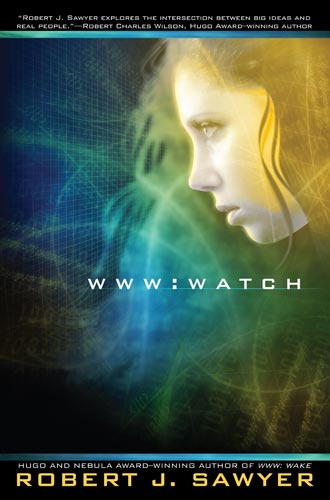Canada’s answer to …
by Rob - December 13th, 2010.Filed under: Uncategorized.

I rather like putting meta-references in my books (sly things that acknowledge that they are, in fact, fiction), and sometimes I give a freebie to the reviewers — a chance for them to take a free shot (I still regret letting myself being talked out of calling my second short-story collection Infodumps).
An example: for over a decade, we’ve run a quote on my books from the Montreal Gazette calling me “Canada’s answer to Michael Crichton.” Hence this little bit in Chapter 14 of WWW: Watch — but no one picked up on it. :)
“So do you guys read Mark Twain here in Canada?” [asked Caitlin]Hee hee hee.“Not much,” said Bashira. “There’s this old Canadian humorist named Stephen Leacock. We read him in English class instead.”
In Caitlin’s admittedly brief experience living here, anyone labeled as “Canada’s answer to …” followed by the name of an American was bound to disappoint.
Robert J. Sawyer online:
Website • Facebook • Twitter • Newsgroup • Email


December 14th, 2010 at 11:58 am
I don’t see the comparison. Rob is a science fiction writer and Crichton writes fiction with ‘sciency’ bits to set the stage. How many science fiction awards does Crichton have?
December 14th, 2010 at 5:08 pm
I disagree; when I first started reading Rob’s work, he immediately reminded me of Crichton, whom I’ve been a fan of since I was a kid. I think the reason he didn’t win any science fiction awards is probably because he was usually classified in the “thriller” genre; I think The Andromeda Strain, Sphere, and Jurassic Park would all have been deserving choices.
Perhaps calling Rob “this generation’s answer to Michael Crichton” would be better than “Canada’s answer to Michael Crichton.”
December 16th, 2010 at 9:35 pm
1) Having read some of Leacock’s work, I must say I didn’t find it disappointing in the least, it’s wonderful stuff! If you’ve never tried it, you should!
2) One of the differences between Rob’s work and Crichton’s would have to be the way that Crichton’s stories often feature technology going horribly wrong and a few characters barely getting through the situation with their lives. Rob presents a more balanced, and often more optimistic view of new ideas. So far, the WWW trilogy has shown Webmind developing into an intelligence that wants to increase the net happiness in the world, and be a force for good. In a Crichton novel, the same premise would probably go the opposite way, with an entity like Webmind doing harm to people like the nanoparticles in “Prey” or the dinosaurs in “Jurassic Park”.
December 17th, 2010 at 3:40 am
It may be true that Crichton’s stories often involved things going wrong, but I disagree with Rob’s opinion that his work is anti-science. I think an important theme of his work was that not understanding science and the consequences of technology often leads to disaster(e.g. Jurassic Park).
December 20th, 2010 at 6:56 pm
Canada doesn’t have to answer to the United States in any meaningful way whatsoever, any more than Algeria or Morocco (which have similar populations) do. The United States is simply more crowded.
December 25th, 2010 at 10:55 am
Would love to have read Leacock in addition to all the others we studied in English classes in high school…never happened for me.
January 2nd, 2011 at 10:07 am
I stayed awake all last night finishing Watch (I read the last chapter just after 7 am) and the last time I did that was with Sphere by Michael Crichton so the comparison works for me! Cracking read, can’t wait for Wonder.